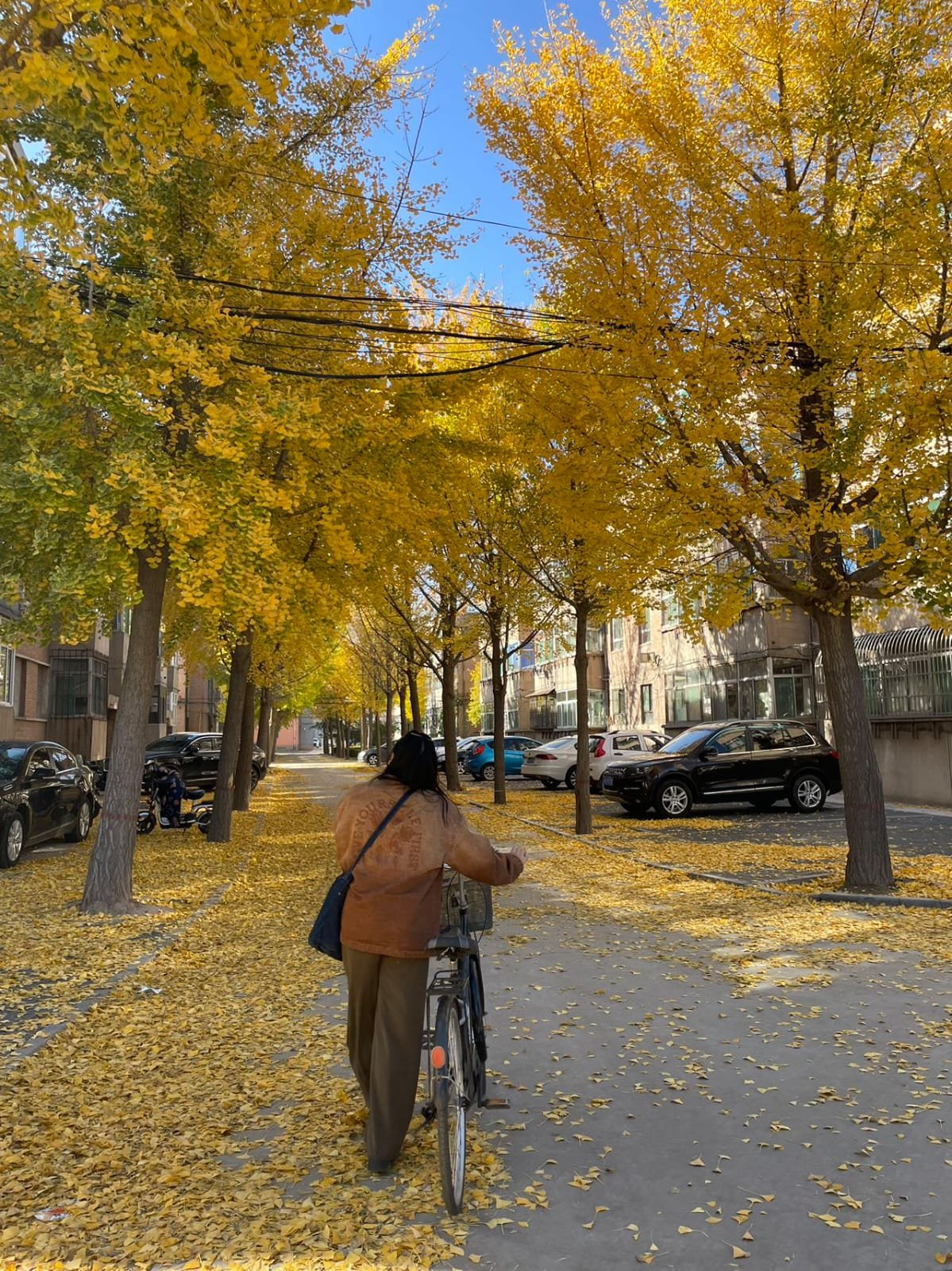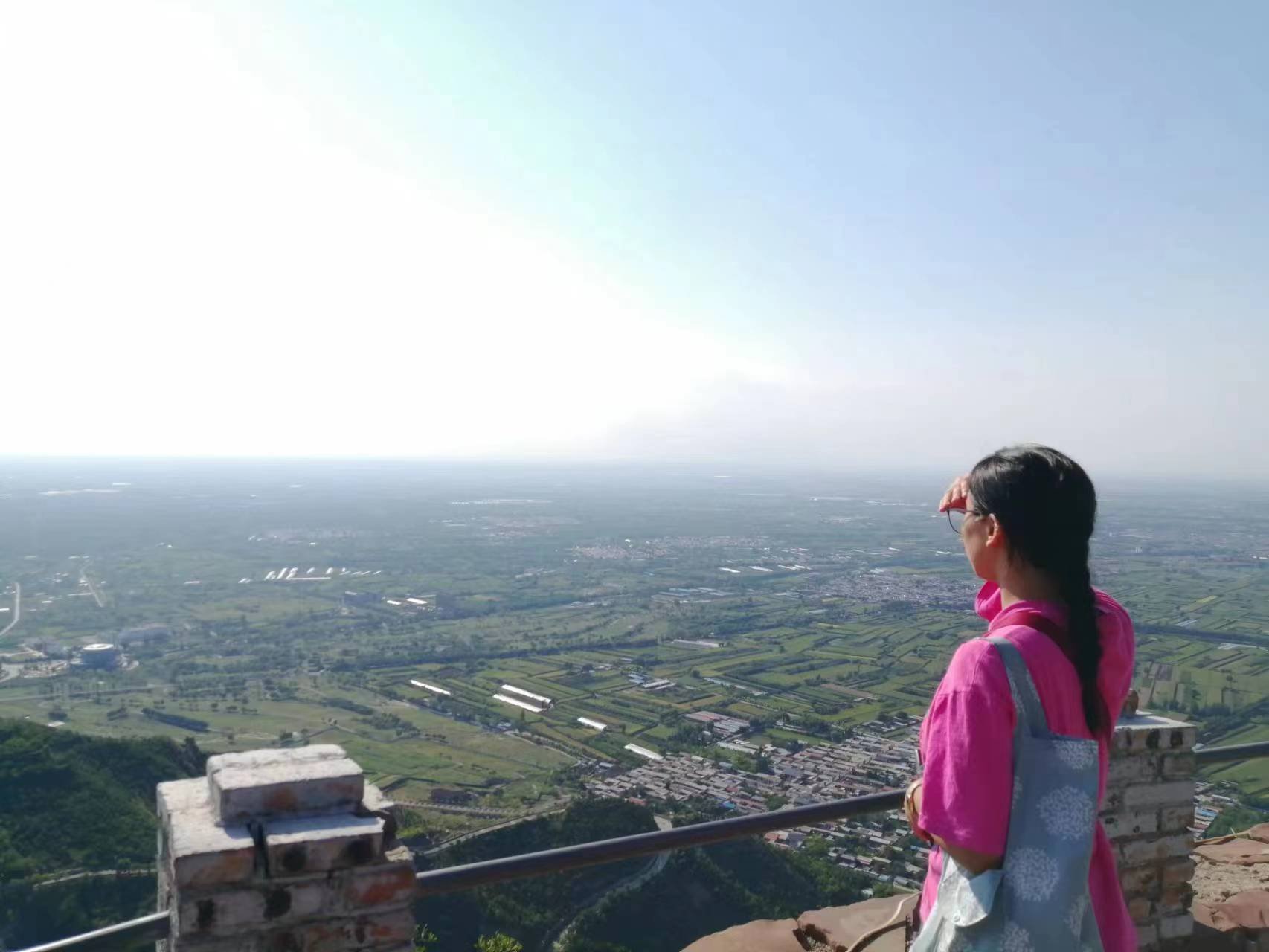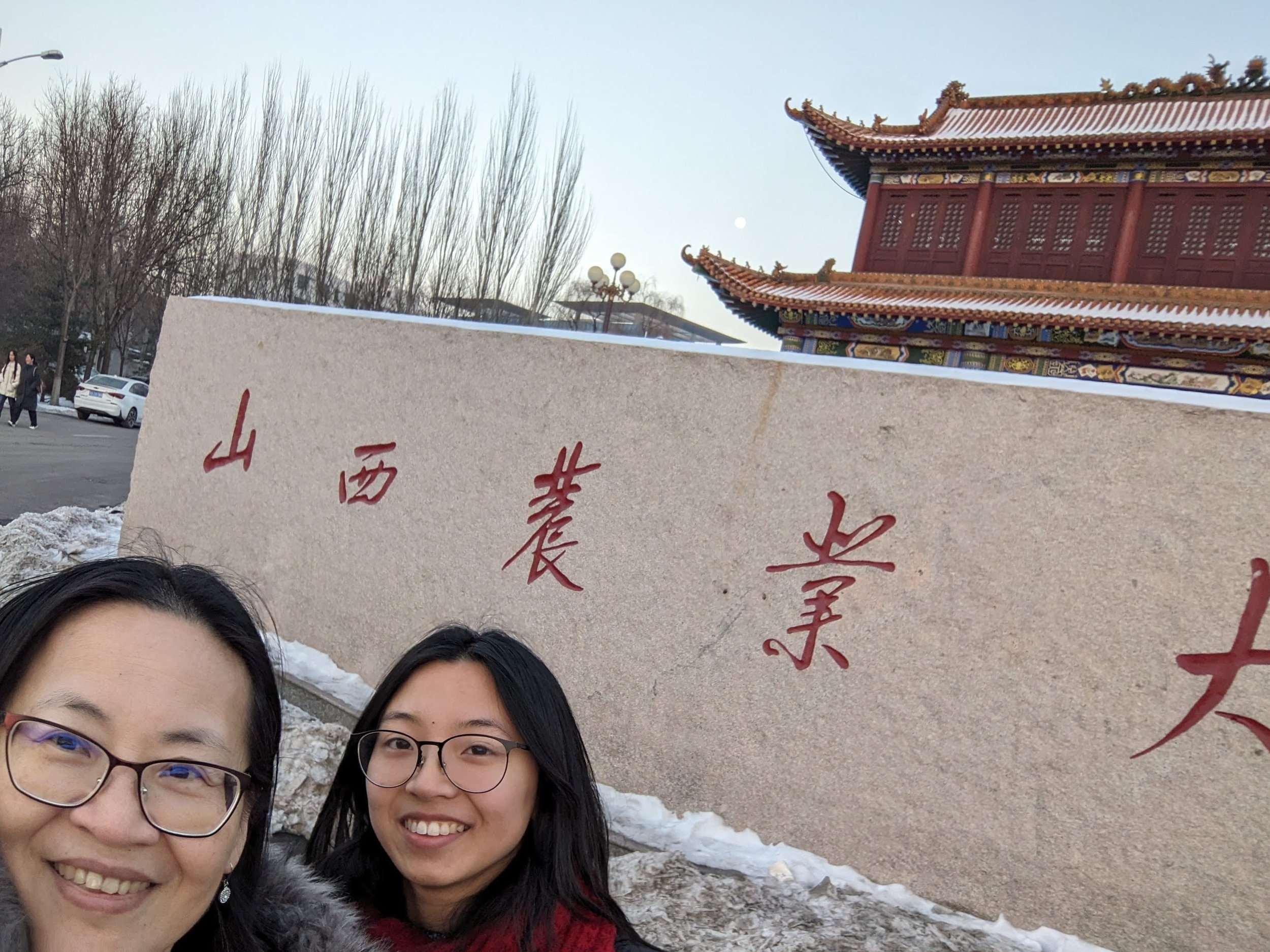Faith in the Future
By Elaine Wu ‘21, Taigu Fellow 2021-2023
It is still hard to believe I am writing this, but after two years of remote teaching at Shanxi Agricultural University, I have finally arrived! I chose to extend my fellowship by another year to, at long last, taste what life is like as an on-site fellow. I was also committed to assisting in this period of readjustment and reintroduction as Shansi Fellows returned to Taigu for the first time since January, 2020.
As I began my third official year at SXAU, but my first one actually on campus, I entered with an eclectic selection of knowledge; an understanding of Chinese graduate student culture gleaned through Wechat messages and online Voov office hours, a savviness with the operation of several oddly specific Chinese softwares, and a vague picture of the quaint place that is Taigu collaged together through student assignments.
I arrived at the Taiyuan airport by myself on August 20th, 2023, the last week of summer vacation, and was greeted at the airport by my supervisor Du Jun. Without any students on campus to assist, Du Jun took the time to personally bring me around and help handle all of the paperwork and incredibly time-consuming logistical onboarding tasks. From driving an hour to and from the city at 7 am to get my medical exams done to spending hours helping me open a bank account (the university switched bank partnerships over the past few years so the workers were unfamiliar with the process concerning foreigners), to meeting his mother whose ID helped me get a Chinese sim card, to getting my campus ID card (they did not know how to label us), to finally figuring out what to do when the ATM swallowed my freshly issued bank card, all on the same day–my China experience was already off to a busy start.
Over the following week, I was able to take it a bit easier; I had time to unpack, clean, and explore campus and finally start processing the fact that after two years I was finally moving into my own apartment in China. I spent my first few days walking up and down stairs and streets, and in and out of unlocked buildings and classrooms. I went to the floor they told me I would eventually teach, stood on top of this little stage in front of a big chalkboard, and tried to soak in the surreal moment, feeling nervous and excited and fake all at the same time.
Showing my mom my main classroom (building 4, room 501)
at the end of the semester.
Before teaching my first in-person class, I was so nervous and panicked to the point of feeling nauseous. Anxious thoughts kept swirling in my mind–how exactly did my professors introduce themselves on the first day of class again? What if I run out of material? What if they don't respect me as an English teacher because I don't look as foreign as they expect me to be? What if I give them instructions and no one understands, or worse, everyone refuses to respond?
If I were to go back in time and talk to past-Elaine, I would offer several words of comfort: First, your first week of class will be fine. Youtubing “how to introduce yourself as a teacher” is just as helpful as you think it is–which is not at all–and talking about your hometown and its claims to fame (Bōshìdùn lobster, anyone?) will be a hit. As for the English Majors, you won't have any trouble filling up time; in fact, you will end up being overprepared for that first class because they will take up the rest of the time answering your check-in question about what they did over the summer. Also, one of your students will conclude her self-introduction by literally saying that she thinks that you’re cool and also loves you.
For that first class, your students may look a bit confused once you step on stage, but once you open your mouth they don’t doubt a thing, and you will be greeted with a simple curiosity. You will soon adjust to the flow of leading a class and quickly find that you have actually learned a lot more about your students online than you thought. You already have a general idea of the words your students already know in English, and you will attempt to take full advantage of this in class to snap their attention back to you when needed. Bask in the instant gratification or challenge of receiving immediate feedback from students as you start to gain a feel for the personality of each class.
As the semester progresses, you will be continuously impressed by the tenacity of your students, and also maybe a bit confused at the dichotomy witnessed in and out of class. Over game nights hosted in the Shansi houses, you will see students who were too shy to speak in class suddenly burst into song or dance, unafraid to restart the music if they feel like they didn't do it right the first time. They may not understand everything you say in class, but body language and persistence go far and are not to be underestimated. You will learn that sometimes students won't respond to your questions, but they do not mean anything by it. Cold-calling is an unfortunate necessity in those 40-50+ size classes, and sometimes students freeze and shut down, too caught up in not knowing how to answer that they don't realize you are trying to guide them through it. It can be frustrating, and sometimes asking for class engagement at 8 am bundled up in the cold feels, in the moment, a bit too similar to when you were gazing out at a bunch of black screens. But standing there on your little stage, out of the corner of your eye you will catch a little nod, a silently mouthed word, a wavering expression, or even a chuckle–brief moments of acknowledgment that serve as reminders that you are here, and everyone is all the more grateful for it.
A street of Ginkgos in my neighborhood
Waving to friends in Pingyao
The semester was off to an unconventional start, not only because we were holding SXAU’s first in-person Oral English classes in three years, but also because all the Shansi Fellows were coming from all different places in the US and we were all in varying stages in the visa process- each with a different procedure, and each incredibly chaotic in its own right. If I was nervous about teaching to start, I was able to gain lots of practice teaching extra classes while the others finalized their documents. With each arrival of another Fellow, there followed an adjustment to our teaching schedules. As the number of classes we taught went from nine, to seven, to five, things slowly started to settle into a familiar rhythm.
I was surprised by how quickly I got used to my surroundings. I attribute this in part to a combination of being two years out of college and suddenly returning to a college's campus, rejoining a cohort environment, and living in a similar climate to the Midwest. Furthermore, living here, in many ways, can be fairly simple. I suppose that when I thought about what it would be like to live here, I was so focused on how different the culture and language would be that it just didn’t occur to me that the mundane could be quite alike. It brings me back to the advice given to me, reiterated through old fellow reports, that my experience here is really what I make of it.
It's been nice being able to see how we grow into our space here. Even the days recently have been passing by faster, as we slowly find new things to do to fill up our free time. From tutoring a bunch of six-year-olds to trekking up the neverending Stairmaster that is Phoenix mountain, to conducting baking experiments, navigating KTV, playing an assortment of sports with students, or going to the gym and eating roadside 串儿 at the Xinjiang place on the way back to campus, in the handful of months that I have spent here and with the knowledge that my time here is also soon coming to an end, I feel an immense gratitude towards the little moments of joy and understandings I have experienced so far. It serves as a constant reminder of the kindness that can be found wherever you go, and that good things will come back to you in twofold.
I think about the boss lady at Fruitnut who never fails to greet us excitedly with a “You’re back again!” whenever I walk into her store. Or the laoban at the Kaolaolao place, who is always ready to chat and never forgets a face, or the table you sat at once before. Francis, an old friend and tutor of Shansi, with his infectiously youthful energy who now essentially serves as the closest thing we have to an onsite senior fellow. Sunny, who scoffed at me when I asked if she measured her ratios for dumpling dough (that was on me for even asking) and who sent me a Taobao link on the Double 11 shopping holiday for thermal underwear after spotting me biking around campus wearing a thin pair of jeans. I think about my shy former student, who never had the courage to talk to me until the final weeks of class, but once she did she proceeded to bring me along to Pingyao, invited all of us teachers to a Taigu bing making class, and invited me to 蹦迪 the night away in Chengdu to reign in 2024. My students from my first semester of online teaching back in 2021, now in their third and final year of their master's programs, who may or may not have now seen and hopefully recognized me walking around campus, who still wished me a happy year of the dragon.
It feels odd to start preparing to say goodbye to somewhere I've really only just arrived, but I can't express how grateful I am for having the opportunity to do so in the first place. Even a year ago, I never would have believed that this now would be my present. Through my time in this fellowship, I have learned to slow down, to sit down with myself and to have assurance and faith not only in the significance of my own efforts but also in where the momentum of my experiences will lead me, wherever that may be. While the time I will have spent in Taigu may just be a mere drop in the vast legacy of Shansi history, I know that my time here matters, and I am proud to have done my part.
Views from the top of Phoenix mountain
The whole group and Gavin together in a cat cafe we frequent captured by the boss
My mom and I at the big gate of SXAU
A moment captured during our visit to the Taigu bing factory museum









